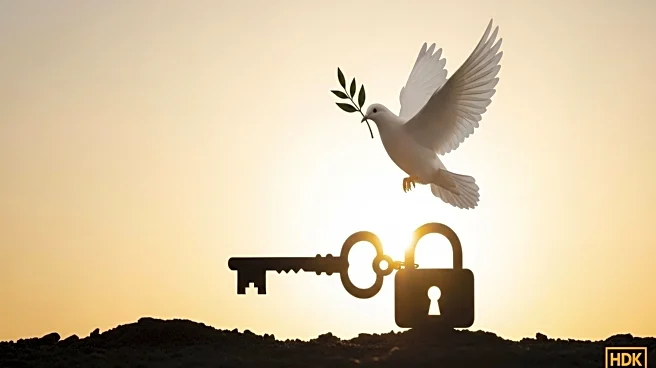What's Happening?
President Trump is set to arrive in Israel as part of a significant diplomatic effort to facilitate the release of Israeli hostages and nearly 2,000 Palestinian detainees and prisoners. This development follows a ceasefire agreement between Israel and Hamas, marking a potential turning point after two years of intense conflict. The ceasefire, brokered with the help of Trump's envoy Steve Witkoff, has led to a temporary halt in hostilities, allowing for the planned exchange. Trump's visit is expected to be met with a warm reception, particularly from families of hostages who credit him for the ceasefire. The exchange is anticipated to begin late Sunday, with hostages and prisoners being moved to designated locations for release.
Why It's Important?
The exchange of hostages and prisoners is a critical step towards stabilizing the region and potentially paving the way for further peace negotiations. The involvement of President Trump underscores the U.S.'s commitment to facilitating peace in the Middle East. The successful implementation of this exchange could lead to improved relations between Israel and Palestine, reducing tensions and fostering dialogue. However, the situation remains delicate, with the potential for renewed conflict if the terms of the ceasefire are not upheld. The presence of U.S. troops in Israel as part of a coordination center further highlights the international community's interest in maintaining peace.
What's Next?
Following the exchange, attention will turn to the governance of Gaza and the disarmament of Hamas, as outlined in Trump's plan. The establishment of an international board of peace, led by Trump and former British Prime Minister Tony Blair, is proposed to oversee Gaza's administration. However, Hamas has rejected foreign oversight, insisting that governance should remain a Palestinian matter. This disagreement poses a challenge to the long-term stability of the region. The international community will closely monitor the situation to ensure compliance with the ceasefire terms and prevent a resurgence of violence.
Beyond the Headlines
The ethical implications of foreign intervention in Gaza's governance raise questions about sovereignty and self-determination for Palestinians. The humanitarian aspect of the exchange, particularly the reintegration of hostages into society, highlights the ongoing need for psychological and medical support for those affected by the conflict. The broader geopolitical dynamics, including the role of the U.S. and other international actors, will continue to influence the peace process and regional stability.









